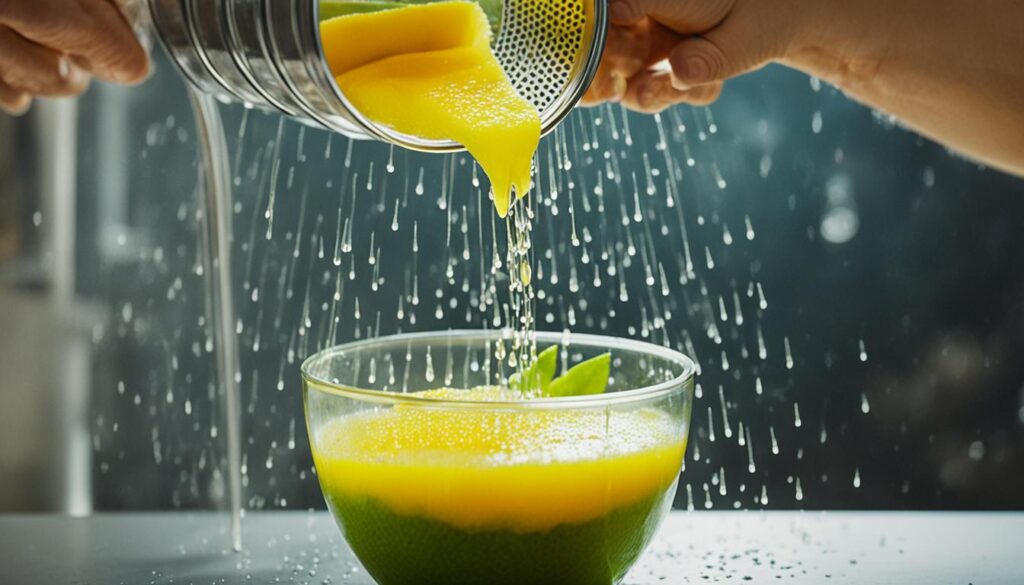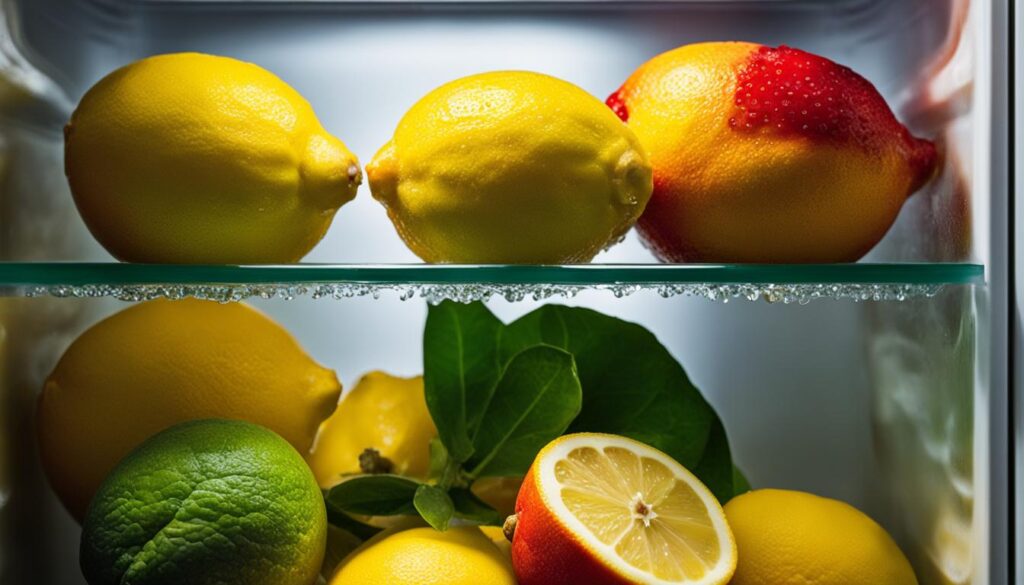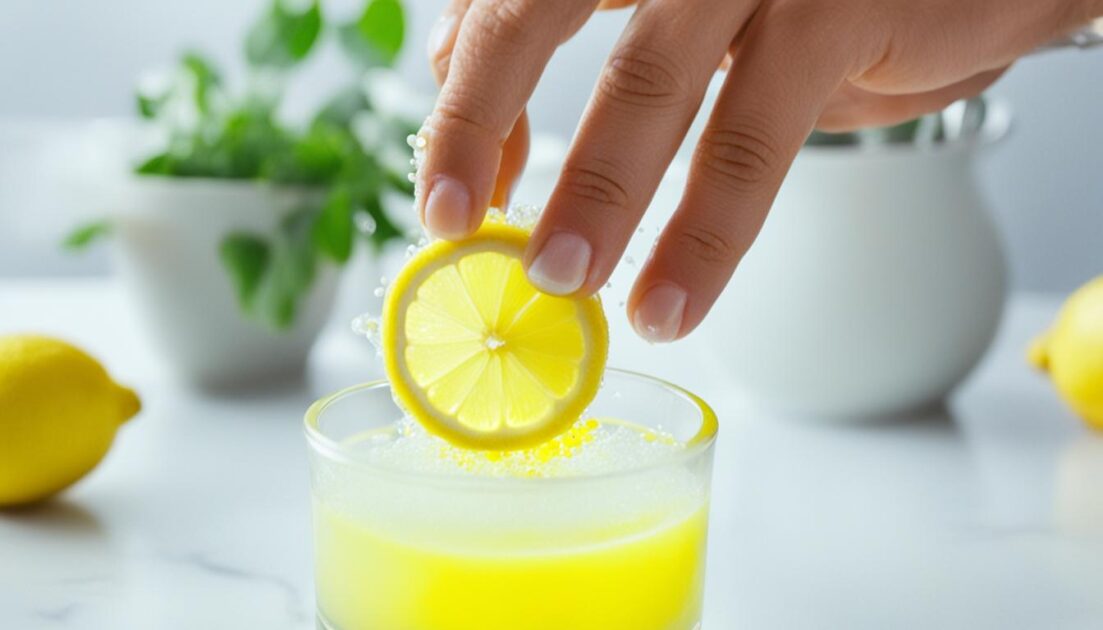Lemons are not only a staple in the kitchen but also a secret weapon for enhancing the flavor of your dishes. The bright and zesty taste of lemons can add a refreshing twist to both sweet and savory recipes. If you want to take your culinary creations to the next level, it’s time to explore the wonders of lemon extract.
Using lemon extract opens up a world of possibilities in your cooking. Whether you’re baking a decadent lemon cake, adding a tangy kick to a chicken dish, or crafting a refreshing cocktail, lemon extract can be your secret ingredient.
So, how exactly do you use lemon extract? It’s simple, really. Just a few drops of this concentrated flavor can transform a dish, adding a burst of citrusy goodness. Lemon extract works wonders in both sweet and savory recipes, allowing you to create a harmonious balance of flavors.
For recipes that call for vanilla extract, you can easily substitute it with lemon extract to infuse your bakes with a zesty twist. Lemon extract can also be used to brighten up marinades, salad dressings, and even sauces.
When using lemon extract, remember that a little goes a long way. Start with a small amount and gradually add more until you achieve your desired level of lemony goodness.
Key Takeaways:
- Lemon extract is a versatile ingredient that can elevate the flavor of both sweet and savory dishes.
- Adding just a few drops of lemon extract can transform a recipe, providing a burst of citrusy goodness.
- Substitute vanilla extract with lemon extract to infuse your bakes with a zesty twist.
- Use lemon extract in marinades, dressings, and sauces to add a bright and refreshing flavor.
- Remember to start with a small amount of lemon extract and adjust according to taste.
Zesting Essentials: Unlocking Lemon Aroma
Zesting is a fundamental technique for maximizing the aromatic essence of lemons. By removing the outermost colored part of the peel, known as the zest, you can capture the vibrant citrus flavor without the bitterness of the white pith. To zest lemons effectively, you’ll need the right tools:
- Microplane Grater: This handheld kitchen tool features small, sharp blades that effortlessly grate the zest from the lemon peel. It’s perfect for achieving fine and delicate zest.
- Citrus Zester: Similar to a grater, a citrus zester typically has small holes or a channel-shaped blade that creates long, thin strips of zest. It’s ideal for adding decorative zest to your dishes.
When zesting lemons, it’s important to approach the task with precision. Make sure to only remove the colored part of the peel and avoid scraping the bitter pith. The zest is packed with essential oils, which give lemons their distinct aroma and flavor. For the best results, zest the fruit just before use to ensure the optimal extraction of lemon aroma.
Why Zest It?
“Zesting lemons is like unlocking a burst of citrus sunshine in your recipes. The zest adds a bright, tangy flavor that can elevate both sweet and savory dishes.”
Adding lemon zest to your recipes can bring a delightful and refreshing twist to your culinary creations. Whether you’re making lemon-infused desserts, vibrant sauces, or zesty marinades, the essence of lemon zest can transform ordinary dishes into extraordinary delights.
Juicing Methods: Yield and Purity
When it comes to extracting the juice from lemons, selecting the right juicing method is crucial to achieve optimal yield and purity. Whether you’re juicing lemons for culinary purposes or crafting refreshing beverages, understanding the different juicing techniques can make a significant difference in the quality of your end product.
Hand Juicing for Small-Scale Extraction
If you’re juicing lemons in small quantities for immediate use, hand juicing is a simple and effective method. Start by rolling the lemon on a flat surface to loosen the pulp and make it easier to extract the juice. Cut the lemon in half and use a hand-held citrus squeezer or simply squeeze the juice out with your hands. This method allows you to control the pressure applied, ensuring maximum juice extraction.
Mechanical Juicers for Larger Quantities
When juicing lemons in larger quantities, mechanical juicers are the go-to choice. These powerful juicers are designed to handle a high volume of citrus fruits efficiently. Simply cut the lemons in half and press them against the juicer’s cone, extracting the juice effortlessly. Mechanical juicers provide consistent and fast results, saving you time and effort in the juicing process.
Straining for Pure Lemon Flavor
To ensure a pure lemon flavor without any pulp, seeds, or residual solids, it’s essential to strain the freshly extracted juice. Using a fine-mesh sieve or cheesecloth, pour the juice through the strainer into a container, allowing the liquid to flow while capturing any unwanted particles. This step guarantees a smooth and clean juice that can be used in a variety of recipes and beverages.

Juicing lemons doesn’t have to be a laborious task. With the right juicing method and proper straining, you can effortlessly extract the vibrant citrus flavor of lemons, enhancing your culinary creations and refreshing drinks.
Infusion Techniques: Flavor Intensity
Infusion techniques are a game-changer when it comes to maximizing the intensity of flavors. Whether you’re looking to elevate the taste of your dishes or create unique culinary concoctions, infusions offer endless possibilities. Let’s explore some infusion techniques that will take your cooking to the next level.
Cold Infusion
Cold infusion is a method that involves steeping lemon zest or peel in a cold liquid to extract its vibrant flavors. To create a cold infusion, simply place the zest or peel in a cold liquid of your choice, such as water or vinegar, and let it sit for an extended period. This technique enhances the citrusy essence of lemons without altering their freshness.
Hot Infusion
For those seeking a quicker flavor extraction process, hot infusion is the way to go. By applying heat to the infusion process, you can expedite the release of lemon flavors. Heat unlocks the oils and compounds in the zest or peel, infusing your liquid with a rich and robust citrus taste. This technique is ideal for creating flavorful syrups, marinades, and sauces.
Fat Infusion
If you’re looking to add a creamy and indulgent twist to your recipes, consider fat infusion. Combining lemon zest with fat sources like oil or butter creates a flavorful infusion that can be used to enhance dressings, sauces, or even baked goods. The fat acts as a carrier, extracting and absorbing the vibrant lemon flavors, resulting in a luscious addition to your culinary creations.
Citrus Infusions
Lemons aren’t the only citrus fruits that lend themselves well to infusions. You can experiment with other citrus fruits like oranges, limes, or grapefruits to create a variety of flavor profiles. Combining different citrus fruits in your infusions adds complexity and depth to your dishes, making them truly remarkable.
Unlock the full potential of citrus infusions by exploring different combinations and pairings. Don’t be afraid to think outside the box and discover new flavor combinations that will tantalize your taste buds.
Incorporating infusion techniques into your culinary repertoire allows you to create dishes that burst with flavor. Whether you prefer the refreshing zestiness of a cold infusion or the boldness of a hot infusion, infusions present endless opportunities for culinary exploration. Start experimenting today and elevate your dishes to new heights of flavor intensity.
Heat Application: Cooking with Lemons
Using heat techniques in your cooking can unlock the full potential of lemons, enhancing the taste and aroma of your dishes. One of the key flavor-enhancing effects of heat application is caramelization. This process brings out a rich and complex flavor in both sweet and savory dishes, adding depth and complexity to your culinary creations.
When lemon juice is subjected to heat, it undergoes a process of flavor intensification. As the juice heats up, the water content evaporates, concentrating the flavors and making them more pronounced. This intensification can enhance the tart, tangy, and refreshing qualities of the lemon, adding a burst of brightness to your dishes.
Another benefit of heat application when cooking with lemons is the softening of lemon acidity. While lemons are known for their acidic taste, the application of heat can mellow and balance out this acidity, creating a more harmonious flavor profile. This is particularly important when using lemons in delicate dishes where a strong citrus flavor may overpower the other ingredients.
Here are some heat techniques you can utilize when cooking with lemons:
- Sautéing: Sautéing lemon slices or zest in a hot pan with oil or butter can bring out their natural flavors and create a delicious caramelized coating.
- Baking: Adding lemon juice or zest to baked goods like cakes, cookies, or bread can infuse them with a delightful citrus flavor.
- Grilling: Grilling lemon halves can create a smoky and slightly caramelized flavor that pairs perfectly with grilled meats, seafood, or vegetables.
- Roasting: Roasting lemons alongside meats, vegetables, or even whole fish can impart a deep, caramelized flavor throughout the dish.
By harnessing the power of heat application, you can elevate the taste and aroma of your dishes, creating a memorable dining experience for yourself and your guests.
The Science Behind Caramelization
Caramelization is a Maillard reaction, where heat causes the natural sugars in a food to break down and form new compounds. This process creates complex flavors and pleasant aromas, enhancing the taste of various ingredients. When cooking with lemons, caramelization can transform their tangy flavor into a sweet and aromatic delight.
| Cooking Method | Benefits |
|---|---|
| Sautéing | Caramelized lemon slices add a sweet and tangy burst to dishes. |
| Baking | Lemon zest in baking creates a subtle and fragrant citrus undertone. |
| Grilling | Grilled lemons offer a smoky and caramelized flavor that complements grilled meats and vegetables. |
| Roasting | Roasted lemons infuse dishes with a deep, rich, and slightly sweet flavor. |
Natural All-Purpose Cleaner
Create a non-toxic all-purpose cleaner by mixing lemon juice, water, and vinegar. This powerful combination of natural ingredients forms an effective cleaner that can cut through grease and grime on various surfaces. Lemon juice acts as a natural disinfectant, while vinegar helps to dissolve tough stains and eliminate odors. Together, they provide a safe and eco-friendly solution for your cleaning needs.
| Ingredients | Measurement |
|---|---|
| Lemon juice | 1/2 cup |
| Vinegar | 1 cup |
| Water | 1 cup |
To prepare the cleaner, simply mix the lemon juice, vinegar, and water in a spray bottle. Shake well to ensure the ingredients are thoroughly combined. This versatile cleaner can be used on kitchen countertops, bathroom surfaces, glass, tiles, and even stainless steel appliances. It not only effectively removes dirt and grime but also leaves a refreshing citrus scent behind.
When using the natural all-purpose cleaner, remember to test it on a small, inconspicuous area before applying it to larger surfaces. This will help ensure compatibility and minimize any potential damage. Always follow the instructions provided by the manufacturer for any specific surfaces or materials. Keep the cleaner out of reach of children and avoid contact with eyes.
Freshen Up Your Fridge
Looking for a natural refrigerator freshener that can keep your fridge smelling fresh and odor-free? Look no further than a simple lemon! Not only is it a versatile ingredient in cooking, but it’s also a fantastic natural odor absorber that can freshen up your fridge.
Here’s how you can use a lemon as a natural refrigerator freshener:
- Take a fresh lemon and cut it in half.
- Place one half in a small bowl or dish.
- Put the bowl with the lemon half in your refrigerator.
The lemon will absorb unwanted odors, leaving your fridge smelling clean and fresh. Plus, it adds a refreshing citrus scent that will enliven your kitchen every time you open the fridge door.
Remember to replace the lemon every week or so to ensure maximum odor absorption. You can use the other half of the lemon for cooking, juicing, or any other lemon-related purposes. Waste not, want not!
So, if you’re looking for a natural and effective way to keep your refrigerator odor-free, give the lemon a try. It’s a simple and eco-friendly solution that’ll leave your fridge smelling fresh and inviting.

Note: The image above illustrates a lemon as a natural refrigerator freshener.
Brighten Your Whites
When it comes to brightening white clothes and tackling stubborn stains, lemon juice is a natural and effective solution. This natural bleach has been used for generations to lift stains and restore the brightness of fabrics. Adding lemon juice to your laundry routine can make a noticeable difference in the appearance of your whites.
The acidity of lemon juice helps to break down and dissolve stains, including those caused by food, drinks, and other common culprits. It works particularly well on organic stains, such as grass, wine, and sweat. The natural bleaching properties of lemon juice also help to remove yellowing and discoloration that can occur over time.
To use lemon juice as a natural bleach, simply follow these steps:
- Add 1/2 cup of lemon juice to your washing machine along with your regular detergent.
- Place your white clothes in the washing machine and start the wash cycle.
- Allow the clothes to soak in the lemon juice and detergent mixture for about 30 minutes.
- Continue with the wash cycle as usual.
After washing, you’ll notice that your white clothes are brighter and fresher. Stubborn stains should be significantly reduced or completely removed. Remember to check the care label of delicate fabrics before using lemon juice as it can have a bleaching effect.
For targeted stain removal, you can also create a paste using lemon juice and baking soda. Apply the paste to the stain, let it sit for a few minutes, and then wash the garment as usual. This technique works well for tougher stains that require extra attention.
Note: Lemon juice may cause slight fading on colored fabrics, so it is best to stick to using it on whites for optimal results.
With its natural bleaching power, lemon juice is a cost-effective and eco-friendly alternative to harsh chemical bleach. Say goodbye to dingy whites and hello to a brighter laundry day with the help of lemon juice.
Soothe a Sore Throat
If you’re suffering from a sore throat, a simple home remedy can provide relief. Try mixing lemon juice with warm water and honey to create a soothing sore throat remedy. Lemons are packed with vitamin C, which can help boost your immune system and provide added support in fighting off pesky throat infections.
Here’s a simple recipe to make your own sore throat remedy:
- Start by squeezing the juice of half a lemon into a mug or glass.
- Heat some water until it’s warm, but not boiling.
- Add the warm water to the lemon juice.
- Stir in a spoonful of honey for added sweetness and soothing properties.
- Gently mix everything together until the ingredients are well combined.
Sip on this concoction throughout the day to help ease your sore throat. The warm water and honey provide a soothing effect, while the lemon juice helps to relieve inflammation and provide a boost of vitamin C to support your immune system.
Remember, this homemade remedy is not a substitute for medical advice or treatment. If your symptoms persist or worsen, it’s best to consult a healthcare professional for proper evaluation and guidance.

Try this natural sore throat remedy as a first line of defense against a scratchy, irritated throat. The combination of lemon juice, warm water, and honey can provide relief while giving your immune system the boost it needs to fight off infections.
Revive Dull Hair
Are you tired of dull, lifeless hair? Try a natural remedy using a simple ingredient found in your kitchen – lemon juice. Not only does lemon juice help remove build-up from your hair, but it also adds a natural shine, leaving your locks looking vibrant and healthy. Plus, there’s an added bonus – the acidity of lemon juice can subtly lighten your hair when exposed to sunlight.
To rejuvenate your hair and bring back its natural shine, follow these simple steps:
- Rinse: After shampooing your hair, rinse it thoroughly with warm water.
- Prepare the lemon juice: Squeeze the juice of one or two lemons, depending on the length of your hair.
- Apply the lemon juice: Slowly pour the lemon juice over your hair, making sure to distribute it evenly from root to tip.
- Massage: Gently massage the lemon juice into your scalp to stimulate blood circulation.
- Let it sit: Leave the lemon juice on your hair for about 5 to 10 minutes. This will allow the acidity to work its magic.
- Rinse again: Rinse your hair thoroughly with cool water to remove the lemon juice.
- Condition: Apply a conditioner to moisturize and soften your hair.
- Dry and style: Dry your hair as usual and style it to showcase its revived, shiny appearance.
Remember, lemon juice can lighten your hair over time, so if you want a subtle sun-kissed look, embrace the power of lemon juice as a natural lightening agent. However, if you have color-treated hair, be cautious as lemon juice may interact with certain dyes.
So, say goodbye to dull hair and hello to natural shine with a simple lemon juice hair rinse. Give it a try and see the remarkable difference it can make.
Expert Tip:
For an extra conditioning boost, you can mix lemon juice with your favorite deep conditioner and leave it on your hair for 30 minutes before rinsing.
Banish Cutting Board Odors
When it comes to preparing food, a clean and odor-free cutting board is essential. Over time, cutting boards can develop unpleasant odors from the ingredients they come into contact with. Fortunately, there’s a simple and natural solution to banish those odors and sanitize your cutting board: lemon!
Lemons have natural deodorizing properties and are effective at eliminating odors. To freshen up your cutting board, follow these easy steps:
- Cut a lemon in half.
- Rub the cut side of the lemon vigorously across the entire surface of the cutting board.
- Allow the lemon juice to sit on the board for a few minutes.
- Rinse the cutting board with warm water and dry it thoroughly.
This method not only eliminates unpleasant odors but also sanitizes the cutting board. The acidic properties of lemon juice help kill bacteria and ensure a clean and safe surface for food preparation.
Next time you notice unwanted odors coming from your cutting board, reach for a lemon to freshen it up and keep your kitchen smelling clean and inviting.
Natural Disinfectant
When it comes to keeping our kitchen surfaces clean and free from harmful bacteria, a natural disinfectant can be a game-changer. Lemon juice, with its high acidity, is a powerful tool for sanitizing and killing bacteria on kitchen surfaces.
To use lemon juice as a natural disinfectant, simply rub it onto the desired surfaces and let it sit for a few minutes. The acidity of the lemon juice works to break down and eliminate bacteria, providing a safe and effective means of cleaning. Plus, lemon juice offers a refreshing citrus scent, leaving your kitchen smelling fresh and clean.
Not only is lemon juice a natural disinfectant, but it also offers additional benefits. It is non-toxic and safe to use around food preparation areas, making it a perfect choice for cleaning countertops, cutting boards, and other kitchen surfaces.
So the next time you need to clean and disinfect your kitchen, reach for a natural solution – lemon juice. Its powerful antibacterial properties and fresh scent make it an excellent choice for a natural disinfectant to keep your kitchen surfaces bacteria-free.
FAQ
How do I use lemon extract in cooking?
Lemon extract can be used in a variety of recipes to add a bright and tangy flavor. It is commonly used in baked goods, such as cakes, cookies, and muffins, as well as in salad dressings, marinades, and desserts.
What are some popular lemon extract recipes?
Lemon extract is a versatile ingredient that can be used in many recipes. Some popular ones include lemon bars, lemon poppy seed bread, lemon meringue pie, lemon pound cake, and lemon-glazed salmon.
Can I substitute lemon extract with lemon juice?
While lemon extract and lemon juice both provide a citrus flavor, they are not exact substitutes for each other. Lemon extract is more concentrated and has a stronger flavor, while lemon juice is more acidic. Substituting lemon juice for lemon extract may alter the taste and consistency of your dish.
How do I make homemade lemon extract?
Homemade lemon extract is made by infusing lemon zest in alcohol, such as vodka or rum, for several weeks. This allows the flavors from the zest to be extracted into the alcohol, creating a concentrated lemon extract. You can find recipes and step-by-step instructions online.
What are the benefits of using lemon extract in baking?
Using lemon extract in baking can add a burst of citrus flavor to your desserts. It can enhance the taste of your cakes, cookies, and other treats, making them more vibrant and refreshing. Lemon extract can also provide a natural acidity that helps balance the sweetness of baked goods.
Are there any substitutes for lemon extract?
If you don’t have lemon extract on hand, you can try using lemon zest or lemon juice as a substitute. Lemon zest can provide a similar citrus aroma, while lemon juice can add a tangy flavor. However, keep in mind that the intensity of the lemon flavor may vary when using these substitutes.
What are some other uses for lemon extract?
Lemon extract can be used beyond the kitchen. It can be added to homemade cleaning solutions to help remove grease and grime. Lemon extract can also be used as a natural air freshener, laundry brightener, and hair rinse. Its refreshing scent and acidic properties make it versatile for various household purposes.






